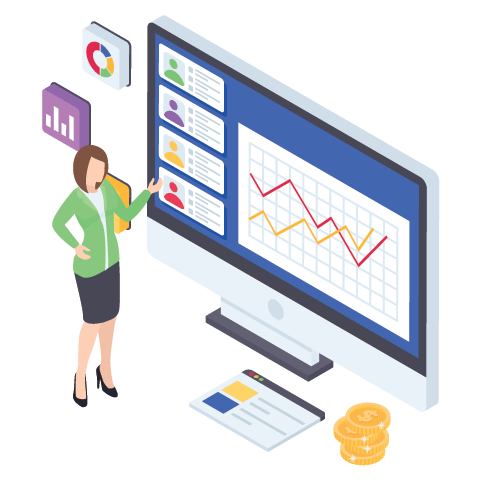We work across a diverse healthcare ecosystem - payers, providers, life sciences, & MedTech
Service Offerings Overview
Healthcare IT Consulting
We help healthcare organizations assess their IT needs, develop strategic plans, and implement new solutions. Our services include:
- IT Needs Assessment : This involves understanding the current IT infrastructure and environment of the customer organization, as well as its business needs and goals. Our consultants will then develop a report that identifies any gaps or areas for improvement.
- Strategic Planning : Our consultants work with the customer organization to develop a long-term IT strategy that aligns with its overall business goals. These involve identifying new technologies to adopt, optimizing existing systems, or improving security and compliance.
- Implementation : Our consultants can help the customer organization implement new IT solutions, such as electronic health records (EHRs), patient portals, or telehealth platforms. These involve providing training, support, and troubleshooting.
- Managed Services : Our consultants can provide ongoing IT support and maintenance services to the customer organization. Which include monitoring systems, resolving issues, and making recommendations for improvement.
- Security and Compliance : Our consultants can help the customer organization protect its data and systems from cyberattacks. These involve conducting security assessments, implementing security controls, and developing incident response plans.

IT Managed Services
Qui laudantium consequatur laborum sit qui ad sapiente dila parde sonata raqer a videna mareta paulona marka
- Network and systems management : This includes monitoring and maintaining the healthcare organization's network, servers, and other IT systems. This ensures that the systems are up and running and that data is secure.
- Application support : This includes providing support for the healthcare organization's applications, such as electronic health records (EHRs) and patient portals. This may involve troubleshooting issues, providing training, and making recommendations for improvement.
- Security : This includes protecting the healthcare organization's data and systems from cyberattacks. This may involve conducting security assessments, implementing security controls, and developing incident response plans.
- Compliance : This includes ensuring that the healthcare organization complies with all applicable regulations, such as HIPAA. This may involve conducting compliance assessments, developing policies and procedures, and providing training.
- Help desk : This provides support to end users with their IT problems. This may involve answering questions, troubleshooting issues, and escalating more complex problems to the appropriate team.
- Infrastructure management : This includes managing the healthcare organization's IT infrastructure, such as data centers, telecommunications, and storage. This ensures that the infrastructure is reliable and scalable to meet the organization's needs.

EMR and EHR Support
Our EMR and EHR support services are a valuable resource for organizations focused on delivering healthcare
- Technical support : This includes troubleshooting technical issues with the EMR or EHR system, such as login problems, data entry errors, and system crashes.
- Advanced Technical support : This includes providing training on how to use the EMR or EHR system, such as how to enter patient data, how to generate reports, and how to use the system's features. Providing advice and guidance on how to get the most out of the EMR or EHR system, such as how to improve workflow, how to reduce costs, and how to comply with regulations.
- Maintenance : This includes working with the vendor in keeping the EMR or EHR system up to date with the latest security patches and software updates.
- Backup and disaster recovery : This includes creating and maintaining backups plans for EMR or EHR system data, as well as having a plan in place to recover the data in the event of a disaster.
- HIPAA compliance : This includes helping the organization comply with the Health Insurance Portability and Accountability Act (HIPAA), which is a set of regulations that protect the privacy and security of patient health information.
We provide different levels of EMR and EHR support remote services:
- L1 support is the first level of support and is typically for basic issues, such as password resets and account provisioning.
- L2 support is the second level of support and is typically for more complex issues, such as troubleshooting technical problems and providing training.
- L3 support is the third level of support and is typically for the most complex issues, such as feautre requests, customizations, workflows, automations, security breaches and data loss.
Remote support services are delivered in a variety of ways, such as:
- Phone : 24X5 L1, L2 & 16X5 L3 support technician will call the user and troubleshoot the issue over the phone.
- Chat : 24X5 L1, L2 & 16X5 L3 support technician will chat with the user in real time and troubleshoot the issue.
- Remote access : 24X5 L1, L2 & 16X5 L3 to troubleshoot more complex issues with Advanceots provided secure & compliant tools.
- Video conferencing : 24X7 On-Call L3 VC Bridge for P1 System down situations.

Data and Analytics Consulting
Advancepts tools can be used to improve the quality and usability of healthcare data. By using ETL, our healthcare data services can help make better use of data and to improve patient care.
ETL can be a valuable tool in analysing healthcare data:
- Extracting data from disparate sources : Healthcare data is often stored in a variety of disparate sources, such as electronic health records (EHRs), claims data, and patient surveys. ETL can be used to extract data from these different sources and combine it into a single data warehouse or data lake.
- Cleaning and formatting data : Once the data has been extracted, its cleaned and formatted before it can be analyzed. ETL can be used to remove errors, inconsistencies, and missing values from the data. It can also be used to convert the data into a format that is compatible with the analysis tools that will be used.
- Standardizing data : Healthcare data often uses different definitions and formats for the same terms. ETL can be used to standardize the data so that it can be easily compared and analyzed.
- Enriching data : ETL can be used to enrich the data by adding additional information, such as demographic data or clinical data. This can help to improve the accuracy and completeness of the data.
- Generating reports and visualizations : ETL can be used to generate reports and visualizations that can be used to communicate the findings of the data analysis. These reports and visualizations can be used to inform decision-making and to improve patient care.
The benefits of using ETL in healthcare data analytics:
- Improved data quality : ETL can help to improve the quality of healthcare data by removing errors, inconsistencies, and missing values.
- Increased data usability : ETL can help to increase the usability of healthcare data by standardizing the data and enriching it with additional information.
- Enhanced data analysis : ETL can help to enhance data analysis by providing a clean, consistent, and enriched data set to work with.
- Improved decision-making : ETL can help to improve decision-making by providing decision-makers with access to accurate and timely data.

Healthcare IT Project Management
Our consultants engage with the clients through process of planning, organizing, and managing the resources needed to successfully complete a project. They understand and work with complexities that involve a variety of stakeholders, complex systems, and strict regulations.
We engage with a number of different approaches to healthcare IT project management. Some common methods include:
- Waterfall: This is a traditional approach to project management that involves breaking the project down into a series of sequential phases.
- Agile: This is a more flexible approach to project management that allows for changes to be made to the project plan as needed.
- Hybrid: This is a combination of waterfall and agile approaches that is often used for healthcare IT projects.
The best approach to healthcare IT project management will vary depending on the specific project. However, all our project managers have a strong understanding of the standard principles:
- Project planning: This involves defining the project scope, identifying the project risks, and creating a project schedule.
- Resource management: This involves assigning resources to tasks, tracking resource utilization, and managing costs.
- Communication: This involves keeping stakeholders informed of the project progress, resolving conflicts, and managing expectations.
- Quality assurance: This involves ensuring that the project meets the requirements and that the final product is of high quality.
- Change management: This involves managing changes to the project plan as needed.
- Risk management: This involves identifying and mitigating risks to the project.
- Vendor management: This involves managing relationships with vendors and ensuring that they meet their obligations.

MedTech Procurement Consulting
Helps clients looking to acquire medical devices & technology and refers to the devices, equipment, and software used in healthcare in a cost-effective and efficient manner. We assist by making strong & merit-based reasearch:
- Market research : The consultant can help the organization to research the market for medical devices and equipment. This includes identifying potential vendors, understanding the pricing landscape, and evaluating the latest technologies.
- Procurement strategy development : The consultant can help the organization to develop a procurement strategy that meets their specific needs and requirements. This includes identifying the right procurement methods, developing a timeline, and setting a budget.
- Vendor selection : The consultant can help the organization to select vendors that can provide the medical devices and equipment they need. This includes evaluating vendor bids, negotiating contracts, and managing the procurement process.
- Contract management : The consultant can help the organization to manage the procurement contract throughout its lifecycle. This includes monitoring vendor performance, resolving disputes, and ensuring that the organization is getting the best possible value for their money.
- Risk management : The consultant can help the organization to identify and mitigate risks associated with the procurement of medical devices and equipment. This includes ensuring that the organization complies with all applicable regulations and that the devices and equipment are safe and effective.

Regulatory Compliance Support
We understand that healthcare regulations are complex and ever-changing. Our healthcare regulatory compliance support services can help you ensure that your organization is always compliant with the latest regulations.
Sure, here is the Healthcare Regulatory Compliance Support section of the website:
Healthcare Regulatory Compliance Support
We provide healthcare regulatory compliance support services to healthcare organizations, including:
- Regulatory consulting: We help you understand the healthcare regulations that apply to your organization and develop a compliance plan.
- Regulatory auditing: We audit your organization's compliance program to ensure that it is effective.
- Regulatory training: We train your staff on the healthcare regulations that apply to their roles.
- Regulatory documentation: We help you create and maintain the documentation that is required to demonstrate compliance.
- Regulatory representation: We represent your organization before regulatory agencies.
Some of the benefits of working with us:
- We have a deep understanding of the healthcare industry and the healthcare regulations that apply to it.
- We have a proven track record of success in helping healthcare organizations achieve regulatory compliance.
- We have a team of experienced healthcare regulatory compliance professionals who are passionate about helping our clients succeed.
- We offer a wide range of healthcare regulatory compliance support services to meet your specific needs.
If you are looking for help with healthcare regulatory compliance, please contact us today. We would be happy to discuss your needs and how we can help you succeed.

